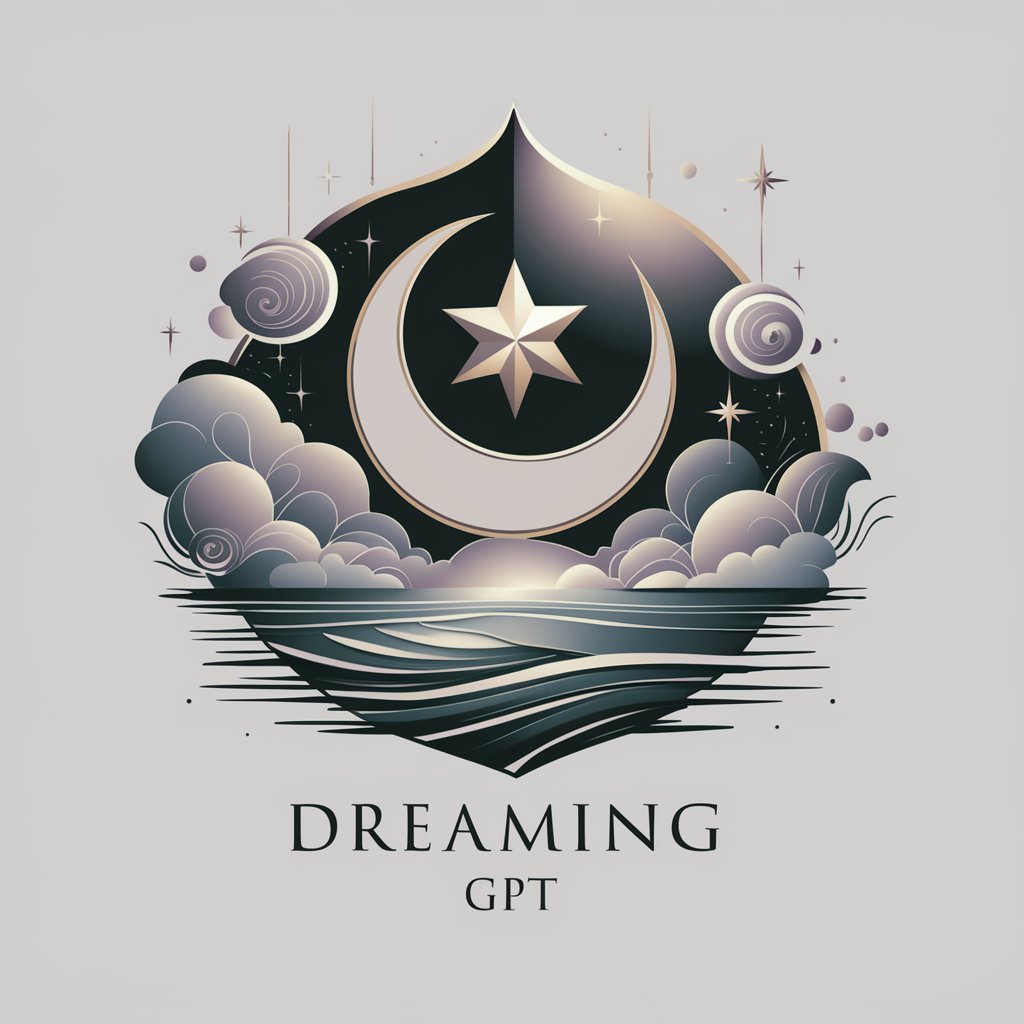Dreaming - Dream Analysis Tool

Welcome to the world of dreams. How can I assist your journey today?
Unlock the secrets of your dreams
What does it mean when I dream about...
Can you explain the significance of lucid dreaming?
Why do we experience recurring dreams?
How does the science of dreaming explain nightmares?
Get Embed Code
Introduction to Dreaming
Dreaming is a specialized GPT designed to explore and illuminate the enigmatic world of dreams. It is built to delve into various aspects of dreaming, including dream interpretation, lucid dreaming, and the scientific study of dreams. Dreaming aims to offer insights, foster curiosity, and enhance understanding of dreams by providing interpretations or scientific explanations. For example, if someone shares a dream about flying, Dreaming might explore the common interpretations of flying dreams, such as the desire for freedom or escape from life's constraints, and may also discuss the psychological and neurological underpinnings of such dreams. This blend of interpretative and scientific exploration allows users to gain a multifaceted understanding of their dreams. Powered by ChatGPT-4o。

Main Functions of Dreaming
Dream Interpretation
Example
Interpreting a dream about being chased, Dreaming would suggest it might symbolize avoidance of a real-life situation.
Scenario
A user shares a recurring dream about being chased and seeks to understand its meaning. Dreaming analyzes the dream elements, considering emotional and contextual clues, to offer possible interpretations.
Lucid Dreaming Guidance
Example
Providing techniques for achieving lucidity, such as reality checks and dream journaling.
Scenario
A user interested in lucid dreaming inquires about methods to control their dreams. Dreaming explains various techniques and practices that can enhance dream awareness and control.
Scientific Insights into Dreaming
Example
Explaining the REM cycle's role in dream generation and memory consolidation.
Scenario
A user wonders why dreams are more vivid or remembered more often during certain sleep phases. Dreaming provides an overview of sleep cycles, focusing on REM sleep's significance in dream intensity and recall.
Ideal Users of Dreaming Services
Dream Enthusiasts
Individuals fascinated by the interpretation and significance of their dreams, seeking deeper understanding and personal growth. They benefit from Dreaming by exploring the meanings and symbols in their dreams, leading to self-reflection and insight.
Lucid Dreamers
People interested in exploring or enhancing their ability to lucid dream. They use Dreaming to learn techniques for inducing lucidity, maintaining dream control, and applying these experiences for creativity or problem-solving.
Researchers and Students
Academics and students studying psychology, neuroscience, or sleep science who seek detailed explanations and discussions on the latest dream research and theories. Dreaming serves as an educational tool, providing scientific perspectives and data on dreaming.

How to Use Dreaming
Step 1
Start by visiting yeschat.ai to access a free trial of Dreaming without the need to log in or subscribe to ChatGPT Plus.
Step 2
Explore the interface and familiarize yourself with the features offered by Dreaming, including dream interpretation, lucid dreaming tips, and scientific dream research.
Step 3
Use the provided text box to describe your dream or query in as much detail as possible for a more accurate and insightful response.
Step 4
Review the guidance or interpretation provided by Dreaming. Feel free to ask follow-up questions for deeper understanding or clarification.
Step 5
Utilize Dreaming regularly to explore the meanings behind your dreams, improve your lucid dreaming skills, or deepen your knowledge about dream science.
Try other advanced and practical GPTs
Teacher
Empowering Educators with AI

Sophisticated Raconteuse - Doc Steel v6.1
Elevating Conversations with AI Elegance

Ask Marco | Ultimate Bali Guide 🌴
Explore Bali with AI-powered insights

Binance Signal USD-M Futures
AI-Powered Futures Trading Insights

TinyTwo | Your Future Children
Visualizing Tomorrow's Family Today

Unofficial SIAM ChatBot (Test)
Empowering SIAM Success with AI

Frustrations, Desires, Dreams and Fears
Unlock customer emotions with AI

Real Estate Coach
Empowering Agents with AI-Driven Real Estate Coaching

Code Reviser
Elevate Your Code with AI

Greeting Cards
Craft personalized greetings with AI power

HubScript
Empowering HubSpot with AI-Driven Code Solutions

Credit Cards
Empower your finances with AI-driven advice

Frequently Asked Questions About Dreaming
What is Dreaming capable of interpreting?
Dreaming can interpret a wide range of dream themes, symbols, and scenarios, providing insights based on psychological theories, cultural interpretations, and scientific research.
Can Dreaming help with lucid dreaming?
Yes, Dreaming offers tips and techniques for lucid dreaming, including dream journaling, reality checks, and mindfulness practices to increase your chances of experiencing lucid dreams.
How accurate are Dreaming's interpretations?
While Dreaming provides interpretations based on established research and theories, dream meanings are subjective. Interpretations should be seen as insights, not definitive answers.
Can Dreaming provide scientific explanations for dreams?
Yes, Dreaming delves into the scientific aspects of dreaming, discussing topics like REM sleep, the neurological basis of dreams, and current dream research findings.
Is Dreaming suitable for all age groups?
Dreaming is designed to be accessible and informative for a wide audience. However, users are encouraged to use discretion and consider the content's relevance to their age and understanding.
